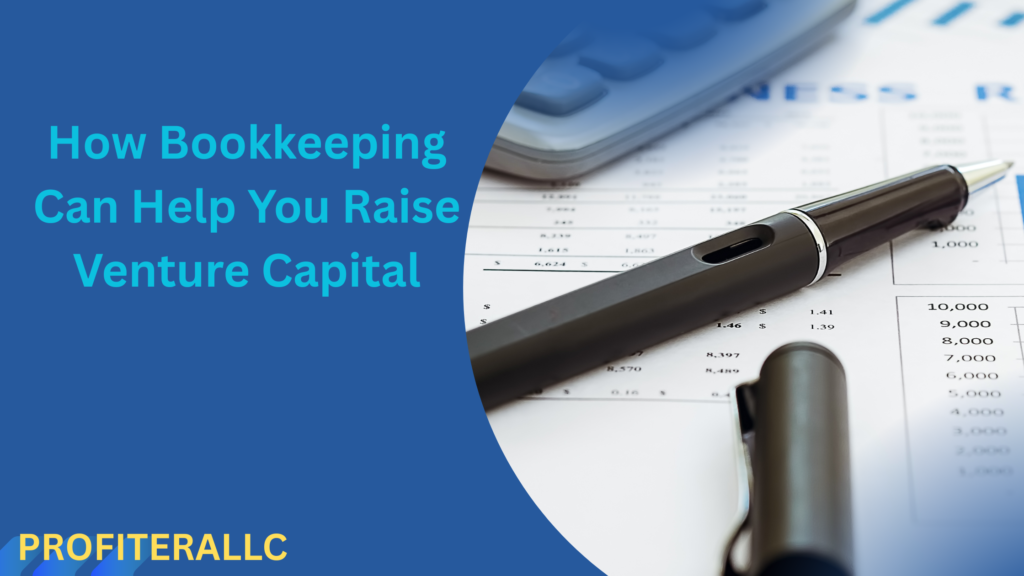
Introduction
Raising venture capital is often seen as a pivotal milestone for startups and growing businesses. It unlocks access to significant funding, top-tier mentorship, and market credibility. However, attracting the attention of venture capitalists (VCs) takes more than a brilliant idea — it requires proof of financial health, operational efficiency, and scalability. This is where solid bookkeeping becomes a strategic asset.
In this guide, we’ll explore how accurate bookkeeping plays a critical role in helping your business raise venture capital, what VCs look for in your financials, and how you can leverage clean books to tell a compelling growth story.
Why Venture Capitalists Care About Bookkeeping
Venture capitalists invest in companies that show high growth potential and sound financial management. While they may take a calculated risk on early-stage startups, they want reassurance that your business has the systems and discipline to handle rapid growth. Here’s why proper bookkeeping matters to them:
- Financial Transparency: VCs need access to clear, trustworthy data before writing a check.
- Investment Confidence: Accurate records give them confidence in your team’s ability to manage money wisely.
- Due Diligence: Investors conduct rigorous financial audits before investing.
- Performance Tracking: Clean books show consistent revenue, burn rate, and cash flow trends.
Bookkeeping, therefore, isn’t just about compliance — it’s about trust, credibility, and readiness for funding.
Benefits of Strong Bookkeeping in the Fundraising Process
1. Establishing Financial Credibility
Financial credibility is the cornerstone of investor confidence. When you present error-free financial statements, profit and loss reports, balance sheets, and cash flow summaries, you’re telling investors, “We take our numbers seriously.”
Startups with sloppy financials often raise red flags. VCs may wonder:
- Is this founder financially disciplined?
- Can they be trusted with millions?
- Are these projections realistic?
Solid bookkeeping answers those concerns with data-backed evidence.
2. Speeding Up Due Diligence
Due diligence is the deep dive investors take before finalizing their decision. It includes:
- Reviewing revenue history
- Evaluating expense patterns
- Analyzing margins, liabilities, and projections
If your records are organized and updated regularly, you’ll breeze through this phase. Businesses with unorganized books delay or even lose funding opportunities due to weeks of document cleanup.
3. Supporting Financial Forecasts
Your future projections are only as credible as the historical data backing them. Bookkeeping ensures that your revenue trends, customer acquisition costs, churn rates, and monthly burn rates are real — not guesses.
When investors see that your forecasts align with previous performance and market trends, it strengthens your valuation and negotiating power.
4. Identifying and Managing Burn Rate
The burn rate — how fast you’re spending investor money — is a key metric for VCs. They want to know:
- How much do you spend monthly?
- How long will current funds last?
- At what point will you break even or raise again?
Bookkeeping helps you calculate and control burn rate so you can demonstrate sustainable growth and runway.
5. Justifying Your Valuation
Investors will challenge your valuation, and rightly so. If you can justify it with clean books showing:
- Growth in MRR (Monthly Recurring Revenue)
- Increasing average revenue per user (ARPU)
- Improved gross margins
…you can defend your ask with confidence. Well-kept records make your valuation less of a guessing game and more of a financial narrative.
What VCs Look For in Your Financials
When you’re trying to raise venture capital, these are some key financial elements investors will scrutinize:
1. Revenue Consistency
Investors love predictable income. A clean income statement showing consistent month-over-month growth gives VCs a positive signal about market fit and scalability.
2. Expense Discipline
Are you spending wisely? VCs want to see lean operations, efficient team spending, and justified investments in tech, marketing, or R&D.
3. Customer Acquisition Cost (CAC) vs. Lifetime Value (LTV)
A strong CAC:LTV ratio (ideally 1:3 or higher) tells investors you have a profitable growth model. Bookkeeping helps you track both over time.
4. Profit Margins
Depending on your business type, margins vary — but growing gross or contribution margins signal better efficiency and pricing power.
5. Cash Flow Health
Bookkeeping helps ensure you have visibility into:
- Net cash flow
- Free cash flow
- Cash runway
Positive or improving cash flow reassures investors of financial control.
Bookkeeping Best Practices Before Fundraising
To prepare for venture capital funding, follow these key bookkeeping best practices:
1. Use Cloud-Based Accounting Software
Tools like QuickBooks, Xero, or Zoho Books keep your financials up-to-date and accessible in real-time. They also generate reports that VCs want to see.
2. Reconcile Accounts Monthly
Ensure that your bank statements, credit card transactions, and books match at least once a month. Reconciliations catch errors early and improve accuracy.
3. Create a Due Diligence Folder
Organize key documents like:
- Income statements
- Balance sheets
- Cash flow reports
- Tax filings
- Payroll records
Having these ready reduces friction during investor audits.
4. Separate Personal and Business Finances
This is especially important for solo founders and early-stage startups. Intertwined finances are a red flag for investors. Set up separate business accounts and keep expenses clearly categorized.
5. Hire a Professional Bookkeeper
Even if you’re a numbers whiz, outsourcing your books saves time and ensures compliance. An experienced bookkeeper can also prepare investor-ready reports and identify financial red flags before they reach the boardroom.
Real-Life Examples of Bookkeeping Helping Startups Raise Capital
Example 1: SaaS Startup With Scalable Margins
A SaaS startup with consistent bookkeeping was able to show:
- 20% MRR growth over 12 months
- 80% gross margins
- A CAC:LTV ratio of 1:4
These clean metrics helped them raise $3M in seed funding within 45 days.
Example 2: E-commerce Brand Controlling Burn Rate
An e-commerce founder tracked all their inventory purchases, advertising spend, and fulfillment costs using cloud accounting. This allowed them to cut waste and extend their runway by 4 months — just in time to close a $500K pre-Series A round.
Example 3: Tech Marketplace That Impressed VCs During Due Diligence
During diligence, this startup’s books revealed:
- Precise records of freelancer payouts
- A decline in CAC with marketing automation
- Month-on-month cash flow improvements
Because of this transparency, the deal closed faster, and the founders negotiated better terms.
Common Bookkeeping Mistakes That Scare Off Investors
Avoid these financial missteps if you’re looking to raise capital:
- Mixing personal and business expenses
- Not tracking recurring revenue properly
- Misclassifying expenses (especially R&D and COGS)
- Inconsistent cash flow reporting
- Not accounting for deferred revenue or accruals
Any of these can derail your investor pitch, delay your round, or lower your valuation.
Final Thoughts: Bookkeeping Is an Investment, Not an Expense
In the journey to raise venture capital, your financials are more than just numbers — they’re a reflection of your leadership, discipline, and scalability. Venture capitalists want to invest in businesses that are not only innovative but also financially responsible.
Clean, accurate, and timely bookkeeping:
- Makes fundraising faster and easier
- Builds investor trust
- Helps you command a better valuation
- Prepares you for future rounds
If you’re serious about raising venture capital, now is the time to get your books in order.
Call to Action
Need help getting your bookkeeping ready for investors? Our team specializes in preparing international startups and founders for venture capital success. Reach out today to schedule a free consultation and audit of your financial records.






